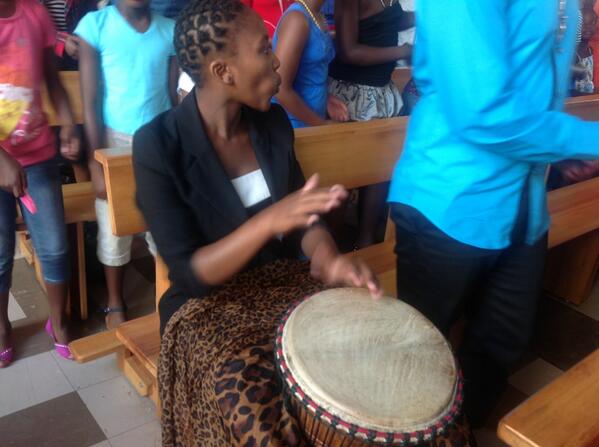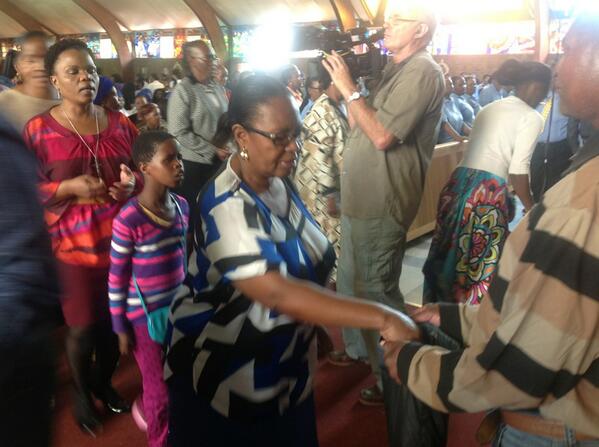 |
Panyaza Lesufi, spokesman for the Department of Basic Education,
took part in a recent radio debate. File photo: Chris Collingridge |
Of the many things I have read or heard this week, there is one that haunts me, that refuses to die down – and, well, perhaps it shouldn’t. It was a debate on transformation in the media hosted by Sakina Kamwendo on MetroFM.
It was comical and saddening at the same time. It was the sort of debate you know is necessary and possibly could be cathartic, but one that left me hanging.
Panyaza Lesufi, an ANC activist from Ekurhuleni who is also spokesman for Basic Education Minister Angie Motshekga, had clubbed together with former journalist Lumka Oliphant, who now works as spokeswoman for Social Development Minister Bathabile Dlamini. It was Cirque du Soleil in town.
Their motif was that the South African story, our story, as recorded by the media, is told through the eyes of white males. Black editors, they posit, are mere puppets.
So, hey, I should reach out to the irreverent Chester Missing! Birds of a feather…
I should send the same message to fellow puppets Moshoeshoe Monare, Mpumelelo Mkhabela, Jovial Rantao and Philani Mgwaba. Aren’t African black editors an endangered species?
Anyway, Mkhabela, the esteemed editor of the Sowetan and deputy chairman of the SA National Editors’ Forum, had the mammoth responsibility on the MetroFM show to answer back.
But what promised to be an interesting debate degenerated on account of the claims to which Mkhabela had to respond. Lesufi – erroneously, I think – focused his attention on the Sowetan, saying the paper hardly breaks stories; its reporters never win awards; he doesn’t know whether the paper is coming or going; and that, despite its editor being black, it projected black people as sex-crazed animals.
Mkhabela, of course, disabused Lesufi of his ignorance, but it became clear that other papers were within sight of the Lesufi-Oliphant Show. City Press and Media 24 were next in the line of fire.
City Press, they argued, was not only a hostile work environment for black journalists but also projected black people as backward and through the lens of white males.
Oliphant used as her example a lead story on speculation about the pending appointments of the heads of the National Prosecuting Authority and the Special Investigating Unit. One was black and the other white.
The manner in which City Press projected these, she argued, was racist in that the reporting about the black magistrate told us he was under investigation but we were not told what violations of the law he committed, and that we, the readers, ought to have been worried. And, meanwhile, the paper, not in so many words, told us that the white guy was a solid legal mind whose candidature must be supported.
Lesufi then added the cherry: Media24, as a newspaper group, offered little if anything that said black people were interested in serious, cerebral stuff. It offered black readers celebrity gossip in Sunday Sun, and told us about tokoloshes stealing groceries in Daily Sun.
Intermittently, they would bemoan the demise of their favourite Distinctly African paper of Mathatha Tsedu. The attack on the media, generally, was rough and raw, if a bit misguided.
It was, for me, quite an unfortunate attack because there was nobody in the studio to defend City Press or the group. When I raised this with Kamwendo on Twitter, she, to her credit, indicated she had invited Adriaan Basson, one of the paper’s executives, who turned them down.
The exodus of senior black executives at Times Media was mentioned in passing and – good or bad – no mention was made of Independent Newspapers or any of its titles.
I felt the accusers were, on occasion, inarticulate and doubtful about their facts. Mkhabela did his best, although he had to spend much of his time defending his publication against unwarranted attacks.
In the end, I felt a good, necessary and controversial debate was wasted. During the week, I repeatedly asked myself what my responsibility, as a black editor is to young black and white journalists who join newsrooms with a hazy view of how they operate. This perhaps explains why this debate haunts me.
When people like Lesufi and Oliphant say the things they say about the media, at a time when I am an editor, what should my responsibility be? Is it to defend the media? Or is it to own up and confirm what a puppet I am? I asked myself how South Africans ought to understand transformation of the media 19 years into democracy. Lesufi and Oliphant appeared content to limit it to how black life was projected by the media. The issue is not, for them, about ownership. Not about reporters not given equal opportunities. It’s not about pay disparities. Or slashing of budgets and withholding of opportunities. No. Content, it appears, is king.
The question too, I felt, was wrongly phrased. Lesufi and Oliphant were content to make the charge that there is racism in the media as a consequence of a lack of transformation. Yes? And? Is that it?
It is, in my view, a waste of time debating whether racism exists in newsrooms. The history of our country will be mirrored in our newsrooms as it is in corporate SA. Racism, a colleague pointed out, lives in the hearts of people. Some kids who will be bankers or journalists of the future are being force-fed racism by their parents.
Granted, there are white families who go out of their way to ensure that racial integration is achieved. Good people, these. But the truth is there will also be those like Afrikaans author Annelise Botes, whose dislike, hatred even, of black people is no secret. What about that racist musician Steve Hofmeyr? What about the young white boys who kill vagrants in Waterkloof for fun? Are these kids not raised in families? Do they not attend the same schools as many of us? The same churches?
Their views may not be shared publicly, but they are supported. Botes, once exposed, boasted about receiving over 1 000 e-mails from people who agreed with her view that black people were dangerous and not to be liked. The truth is that racism is a cancer, it gnaws away at society, inch by inch, turning young hearts into grown-up bigots in cushy offices.
Some of those who think like Hofmeyr or Botes, who are caught up in corporate SA, know they must behave or lose their jobs – but it doesn’t mean they don’t think of black people as sub-human, or, like matter that is merely part of the ecosystem. Or to quote another racist, Eddie Roux, like “dogs and trees and, more remotely, cows”.
Other closet racists would make the loudest noise about affirmative action; would ignore employment equity reports and, if they had their way, would prefer not to appoint black people to any positions of authority. In their eyes, black is the equivalent of incompetence.
Others would trump up trivial charges against black people, when they tolerate white incompetence. They will justify it. But this makes them racists no less. They are, in fact, the worst racists. They pretend to like black people, smile with them, compliment them, when they hate their guts. Let us not pretend: racism is alive and well in most of South Africa, its workplaces, including newsrooms. To say so, Lesufi and Oliphant should know, is not to be bold. It is to point at a lived truth.
It is one thing to fob off Lesufi and Oliphant. Quite another to face up to the truth. This is why I think those who own big media firms must take a good look in the mirror and see what story it tells them about transformation. Whether that story is indeed told through the eyes of white males. If they are honest, I think, they will admit that transformation has not been embraced and that boxes are merely being ticked to comply with legislation.
As that courageous woman Rosa Parks put it: “Racism is still with us. But it is up to us to prepare our children for what they have to meet, and, hopefully, we shall overcome.” Hopefully.
* Makhudu Sefara is the editor of The Star. Follow him on Twitter @Sefara_Mak
The Star
This Opinion piece
appeared at The Star Newspaper on the May 17 2013.








.jpg)







.jpg)
.jpg)
